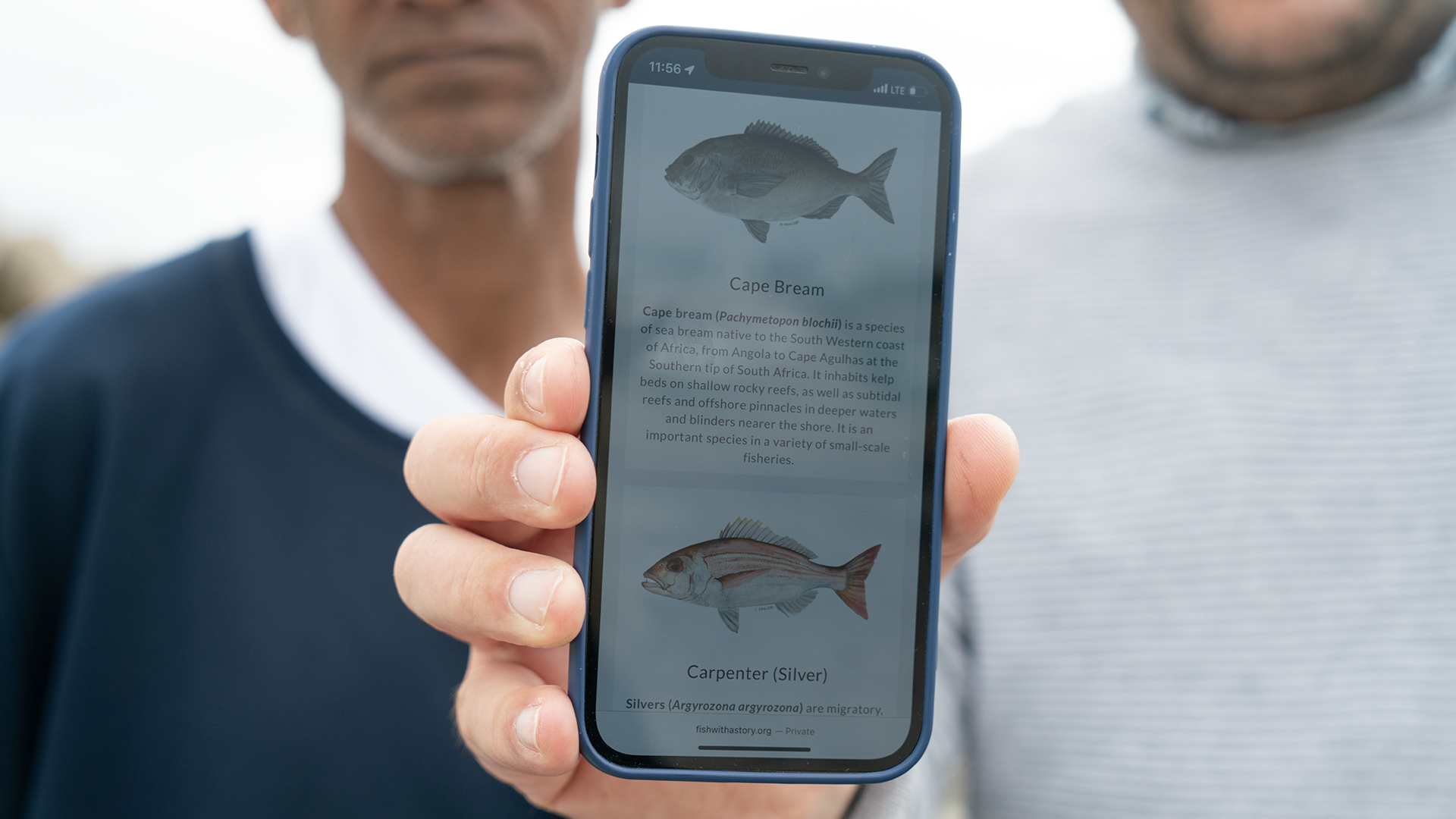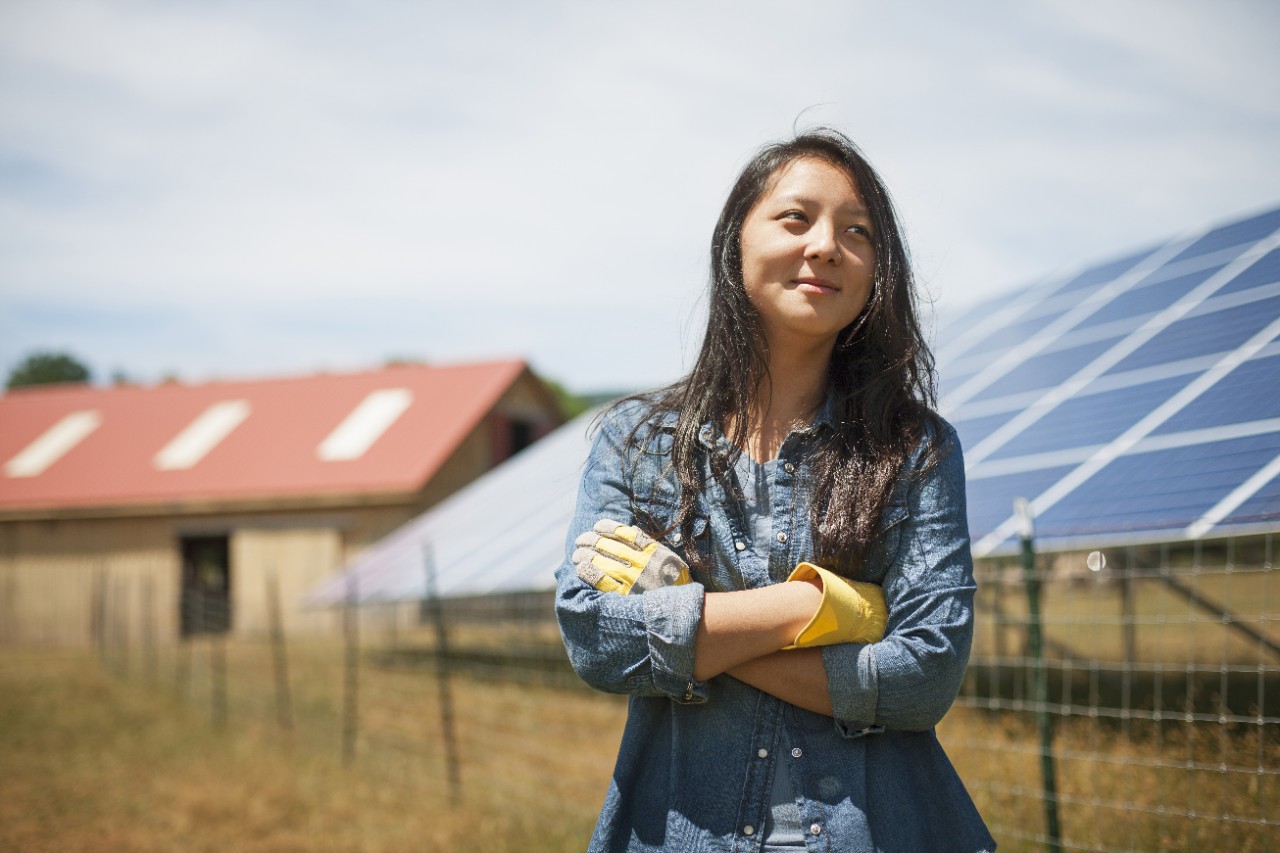A billion people are vulnerable to climate change and economic shocks. Can fintech solve for both?
April 29, 2024 | By Christine Gibson
The first time David Shoshola went out on a boat with his father, he fell in love with the ocean. Having grown up in Lambert’s Bay, a fishing village on the west coast of South Africa, Shoshola says, “the salt water is in my veins.”
He knew that following in his father’s footsteps would mean a hard life physically and financially. A third-generation fisherman, he had lived in a shack his entire life because no one in his family received a formal paycheck, a requirement to qualify for a mortgage.
Operating almost entirely in cash, seafood trade can be among the most opaque in the world, according to fisheries scientist and entrepreneur Serge Raemaekers, with many negative incentives for small-scale fishers. Middlemen buy fish directly from boats for next to nothing — some 5.8 million fishers in the world earn less than $1 per day — and sell at a significant markup. Benefits and profits tend to accrue much higher in the supply chain, with these fishers left in the lurch.
And because they receive such a low price per pound, they must catch as much as possible when the fish are on the bite. In addition, they may even be compelled to reel in only the types of seafood buyers want — be it abalone or rock lobster — not necessarily what’s most abundant or even legal.
Now rising ocean temperatures are making Shoshola’s livelihood even harder. Going to sea in older boats without state-of-the-art monitoring equipment, small-scale fishers stay safe by relying on local ecological knowledge passed down through centuries. But climate change is undermining their local wisdom. Currents are shifting, weather is erratic, and migration patterns have begun to stray. As a result, fishers often return to shore empty-handed, unsure where their next meal will come from.
That’s why Raemaekers co-founded Abalobi, a social enterprise with a tech platform that is making the seafood value chain more transparent and equitable while building a critical knowledge base related to catch data and guidance on fishery-rebuilding initiatives.

The Abalobi app, above, is a fintech tool that supports sustainable fishing, catch data recording, traceability, market access, and community engagement. South African fisher David Shoshola, in banner photo, used his Abalobi account to qualify for loans that have helped him expand his business. (Photos courtesy of Abalobi)
It’s evidence that technology can help the more than 80% of the unbanked population living in the planet’s most climate-vulnerable regions become more resilient to both financial shocks and the impacts of climate change. By bringing more people into the digital economy, fintech apps can connect vulnerable users to services such as loan forgiveness, microinsurance or savings opportunities to cushion the effects of climate shocks.
To magnify these efforts, the Mastercard Center for Inclusive Growth joined the Climate Innovation for Adaptation and Resilience (CIFAR) Alliance, a cross-sector coalition dedicated to accelerating and scaling innovation in digital finance for low-income people affected by climate change. Both organizations want to train the wider financial inclusion community to approach their work with environmental sustainability in mind.
Intertwined crises
Many world leaders are beginning to recognize that financial inclusion and environmental sustainability are inextricably entangled, and that to improve one we must galvanize the other. “We cannot think about eradicating poverty without caring about climate,” Ajay Banga, president of the World Bank and former Mastercard CEO, said in January at Davos. “We have a set of intertwined crises.”
Because the problems are so complex, with roots in ecology, economics and long-standing social structures, solutions must come from multiple angles — which demands expertise in fields that don’t usually overlap, says Ali Schmidt-Fellner, a vice president at the Center for Inclusive Growth who is leading this work. “Our goal is to demonstrate that there’s a critical role for financial inclusion in addressing climate change.”
The Center is harnessing Mastercard’s central spot in the financial services industry by working with CIFAR to launch the Climate Smart Innovation Hub, a virtual platform that connects entrepreneurs with climate scientists, financial service providers and investors to accelerate the development of tools and resources that will provide new solutions to help people adapt and become more resilient to climate change.
CIFAR “is mixing the financial inclusion community’s knowledge on how to serve low-income populations with the climate sector’s knowledge on how to serve nature,” says David del Ser, chair and chief innovation officer at BFA Global, a founding member of the Alliance.
As a first step, the hub has unveiled the Climate Smart Financial Products gallery, which showcases more than 70 banking and financial service solutions designed to drive financial resilience and promote environmental sustainability, including Abalobi, the platform designed to support small-scale fishers like Shoshola. The products serve affected populations around the world with a range of financial tools including credit, savings, payments and insurance.
“The product gallery is a starting point for educating investors on what climate-smart financial products are, what types of services are most popular and which business models work,” Schmidt-Fellner says.
To help newer startups, the Center for Inclusive Growth, CIFAR and BFA Global have also held “climathons” in Cape Town and Bogota. At these high-speed boot camps, entrepreneurs brainstorm solutions alongside experienced scientists, software engineers and government planners. Prizes are awarded for the best product ideas, but the long-term goal is to start ongoing conversations between local fintech developers and climate experts.
“This is a new concept,” Schmidt-Fellner says, “so we’re trying to connect a new set of stakeholders who haven’t previously worked together as much.”
Click bait
Co-founded by fishers and scientists, Abalobi supports communities in keeping value local and fostering social entrepreneurship via a digital marketplace and traceability platform where fisher groups can sell directly to restaurants and other buyers. The fishers get a fair price; the chefs get today’s catch with a transparent legal provenance and a story to relay to their patrons. Fishers and scientists also gain valuable data insights to enhance fisheries’ rebuilding efforts.
Before joining the platform, only 52% of Abalobi users had steady enough income to feed their families every day; afterward, the number rose to 88%. Fishers can also present the digital log of their transactions to apply for credit. Shoshola used his Abalobi account to qualify for loans that have helped him expand his business — and invest in his first house.
“I am no longer in that vicious circle of poverty,” he says.
Last year, Abalobi was a finalist for the Earthshot Prize, which each year offers £1 million grants to five organizations that have developed groundbreaking environmental solutions. Mastercard supports the prize, helping to nominate and evaluate candidates and match winners with resources, particularly those operating at the intersection of sustainability and financial inclusion.
Shoshola’s story lends credence to CIFAR’s mission: using fintech tools to mitigate the financial effects of climate change and improve lives. Since he can afford to be more selective about what he catches, he can sustain a legitimate livelihood from ecologically resilient species. And by collecting data through catch logs and GPS trackers on the boats, Abalobi is amassing a new reservoir of wisdom to guide Shoshola and his fellow fishers to expand their ocean stewardship efforts.
“That helps us be custodians of the ocean,” Shoshola says. “It’s sustainability — what are we going to leave for the next generation?”

sustainability
At the intersection of climate adaptation and financial innovation
Financial technology and product innovation can help drive a climate-resilient future. The Climate Smart Product Innovation Hub features tech-enabled banking and financial service solutions that meet real planetary needs and serve climate vulnerable communities and natural ecosystems.
Explore the Hub here